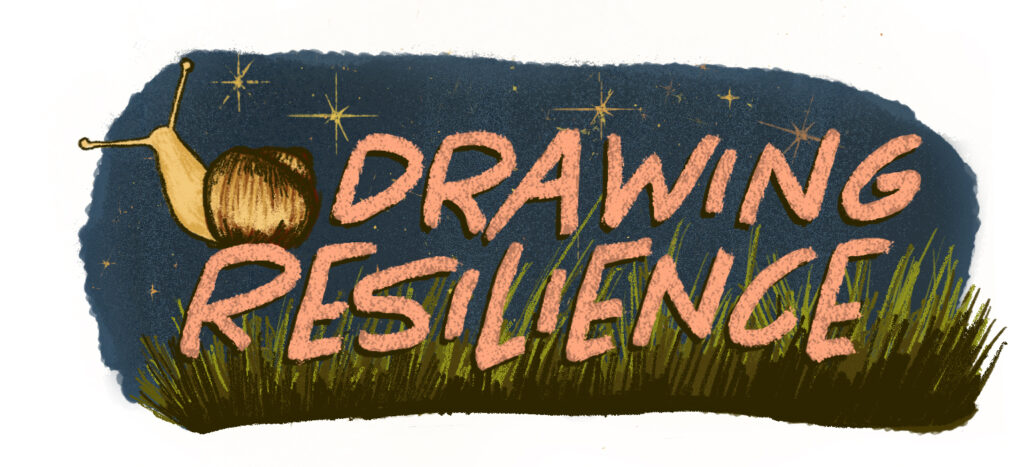
Drawing Resilience: Margaret Killjoy

Illustrations and interview by Nhatt Nichols
Margaret Killjoy is a transfeminine author, editor, and podcaster currently based in the Appalachian mountains. Her most recent book, Escape From Incel Island, is available through Strangers in a Tangled Wilderness. Margaret hosts two podcasts that explore resiliency in different ways: Cool People Who Do Cool Stuff, and Live Like the World is Dying. You can check out more of her writing and music at birdsbeforethestorm.net.
Nhatt:
Did your ideas around community and resiliency change when you settled down?
Margaret Killjoy:
For most of my adult life I traveled full time out of a backpack and a van, and I’ve always been fairly independent. My ideas of community have involved people, but in disparate ways; different groups of people for different periods of time. I relied on the broader net of queer and anarchist communities, then when I moved rurally It was within the context of an anarchist community in western North Carolina.
The pandemic is primarily what changed my context. It left me feeling more isolated and less part of a community with which I could successfully navigate a crisis. So I’ve been more self-reliant or reliant upon smaller groups, smaller, tight-knit groups of people since 2020.
Nhatt:
How do anarchism and resilience work together for you?
Margaret Killjoy:
I believe that my project as an anarchist is to develop responsibility. Anarchism is a challenge to be as responsible to ourselves and other people as possible, because it challenges the world to say that we don’t need authority structures in order to thrive and get things done.
But what we do need in order to achieve freedom is responsibility. I think resilience is largely built upon responsibility. By being resilient, you’re saying “I trust the people around me and can solve the problems that come our way.”
Nothing makes me feel more like an adult than when a crisis happens, and there’s no one I can turn to, to solve the problem. I spun out on the freeway, in my van during a blizzard in the mountains, once. And there’s nothing I can do, right? It is no safer for someone to come and get me than for me to get myself out of that situation. So, on an individual level, that’s resilience; the ability to look at a crisis and say, I can solve this. It is more useful to be able to deal with larger crises when we scale that up to the community or society level.
I believe an anarchist interested in resilience needs to cultivate individual, community, and social resilience and responsibility.
I believe very strongly that freedom is a relationship between people; freedom is not something that exists, isolated alone in a vacuum. I’m not free when I’m alone in the middle of the woods because I can’t actually accomplish the things I want to accomplish. In order to be as free as possible, I need to participate in community or society and then count on that community to be in relationships of freedom with each other. I do that for others by trusting people and granting them autonomy and expecting the same and in return, and by learning to develop my own personal boundaries and by respecting other people’s personal boundaries.
Nhatt:
I just listened to an author talk where Fredrik Backman said “Community is the sum of our choices,” and I’ve been thinking about that a lot.
The reason we’re here is because we’ve all made choices that are similar and complement each other. And it makes sense for us to continue to make those choices, even if we don’t agree on everything.
Margaret Killjoy:
I like that. I think there’s two different meanings of the word community. There’s the community you choose, the queer community or the punk community. Even when people say the community in X town, they really mean their buds, the people that they’re ideologically similar to.
Community also means the people you’re near. I think about this more as I become more rural. My immediate neighbors share nothing overtly political with me, besides maybe the Second Amendment. So I’m learning whether or not I can rely on people who have fairly different political ideas than me at a time of increasing political polarization. If we were to have a major crisis, the grid goes down, gas stops being available, whatever, the people that I’m going to have to navigate that with are the people who live in my holler.
Get this and other rural content in your inbox with the Rural Assembly newsletter.







